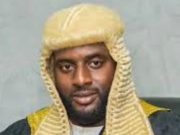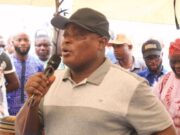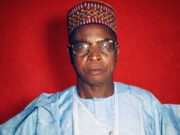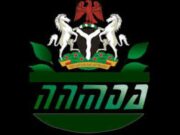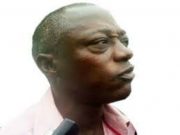Oyo State Commissioner for Education, Science and Technology, Hon. Segun Olayiwola, has said that the positive turnaround witnessed by the education sector in the state is as a result of Governor ‘Seyi Makinde visionary and insightful leadership.
He noted that the administration has implemented many policies towards transforming the sector, which prior to Governor Makinde’s assumption of office in 2019, had become deplorable, with education quality at its lowest ebb.
Olayiwola, who spoke at the Omituntun 2.0 Inter-Ministerial Briefing on Thursday, said the government’s policies on budgetary allocation, reducing the gap in education infrastructure, reducing the number of out-of-school children and increasing the workforce in the education sector, among others, have had a positive impact on the quality of education in the state.
He stated that the direct outcomes of the policy actions include, among other things, the growing improvement in the quality and standard of education, reduction in education infrastructure deficit, increased education enrolment and an overall progress in the all-important sector.
The Commissioner maintained that as a result of the efforts of the government, which has demonstrated the political will to improve education, the sector has attracted interventions from development partners and Old Students Associations, which are helping greatly in meeting education needs across the state.
Speaking on efforts to further standardise the education sector, Olayiwola said that the state would no longer take the issue of hooliganism lightly across its public schools, saying that the state is collaborating with the police to ensure that peace and order are maintained across schools.
He warned parents and wards to be wary of all activities that could reduce the quality of the education sector, noting that the state would now fully enforce the laws against use of mobile phones by public school students and also attack examination malpractices squarely.
According to Olayiwola, Governor Makinde’s actions have also had far-reaching effects on the education family, which is the largest Ministry in the state, as it has 12 full departments headed by Level 17 Officers as directors, 22 Permanent Secretaries, comprising 10 Tutors-General manning the 10 educational zones and 10 Inspectors-General manning the 10 educational zones, among others.
He added that the Ministry also has seven agencies including SUBEB and TESCOM; 10 tertiary institutions, including the Ladoke Akintola University of Technology, Senator Abiola Ajimobi Technical University, Emmanuel Alayande University of Education, three polytechnics in Ibadan, Eruwa and Saki, a School of Agriculture in Igbo-Ora and a School of Health Technology.
The Commissioner stated that as a result of Governor Makinde’s commitment to improving education, which led to the recruitment of thousands of teachers in his first and second term of office, the state has additional 15,000 teaching and non-teaching staff, who are manning 646 secondary schools and 2,506 primary schools.
Olayiwola noted that the Ministry has also been in charge of overseeing private schools, performing oversight functions over them.
He said: “By the time this administration came into being in 2019, the education sector in the state was in a bad shape. The governor had to highlight the problems we met on the ground.
“One of the challenges then was that there was a high percentage of out-of-school children. We had a high percentage of out-of-school children, poor performances in WAEC, NECO, GCE, and JAMB and all that.
We also had one and a half university; the Technical University and half of LAUTECH due to the joint ownership with Osun State.
Also, subventions to tertiary institutions were not paid. There was an agreed subvention to be paid to these higher institutions, but it was not paid for years, and so, there were frequent strike actions in our tertiary institutions.
“We also had the challenge of inadequate facilities and infrastructure in the basic and secondary schools.
Non-payment of counterpart funding for intervention projects was also another challenge. We lost opportunities of bringing in counterpart funds from outside the country because of non-payment of our own share at that time. This was because when they come with that duty, the state is expected to pay either 10 per cent of the cost of the infrastructure or 20 per cent, but to pay 10 per cent or 20 per cent was a problem to the former administration.
“Schools were also understaffed.
But, because of the innovation that Governor Makinde brought into fixing the challenges that faced the education sector and because of his ingenuity, all these challenges have been surmounted.
“Upon his assumption of office, children who dropped out of schools rejoined and the major evidence of this is that between 2023 and now, the number of public primary schools has risen from 2,449 to 2,506, while the number of public secondary schools, which was 573 in 2023, has risen to 696, signifying a significant improvement in the number of schools.
“Up till now, people are still approaching us for approval for the establishment of more public schools. With the support of a development partner, which provided a counterpart fund, we have reduced the number of out-of-school children drastically.”
In the area of reducing the infrastructure deficit in the education sector, the Commissioner maintained that the state government has built additional model schools and classrooms, pointing out how the state recently renovated and equipped 105 public schools, while work is ongoing on another set of schools.
He added that the state has also succeeded in improving access for special needs students, orphans and vulnerable children.
Another area where Olayiwola noted that the state government succeeded in improving the educator sector was in terms of recruitment.
He maintained that the governor’s decision to recruit more teachers through a transparent recruitment process has had a positive effect on education, saying: “The recruitment of teachers has also had a positive result on education in the state. With the 15,000 teachers that we recently employed, we surpassed one of the UNESCO education standards of one teacher to 30 students. By our standard, after employing 15,000 teachers, what we have on ground now is one teacher to 25 students.
“I also have to tell you that the process for the recruitment of teachers was so transparent that virtually all states of the Federation are looking up to us for one thing or the other in this area.”
Hon. Olayiwola maintained that the governor has also successfully solved the ownership logjam bedeviling LAUTECH, while he also secured the upgrade of Emmanuel Alayande College of Education to university, making universities owned by the state go up to three.
He added that the Ministry has created a linkage between the universities and other international institutions with a view to expanding the frontiers of learning, stating that this linkage resulted in a research by five Abiola Ajimobi Technical University lecturers winning international acclaim and securing a patent from the Federal Government for 25 years in the first instance.
The Commissioner had on his entourage the Permanent Secretary, Mrs Bamidele Oyinloye; 12 Directors and the Secretary, School Scholarship Board.
Packaged by Adekunle Adegboyega





















